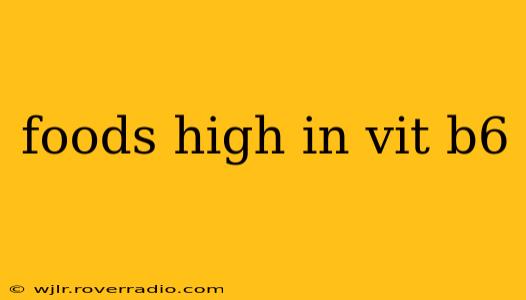Vitamin B6, also known as pyridoxine, is an essential nutrient crucial for numerous bodily functions. It plays a vital role in brain development, immune function, and red blood cell formation. A deficiency in B6 can lead to various health problems, highlighting the importance of including B6-rich foods in your diet. This comprehensive guide will explore excellent sources of vitamin B6, addressing common questions and concerns.
What are the best food sources of vitamin B6?
Many foods naturally contain vitamin B6, and incorporating a variety of these into your diet is the best way to ensure adequate intake. Some of the best sources include:
-
Organ Meats: Liver, kidney, and heart are exceptionally rich in vitamin B6. A 3-ounce serving of beef liver, for example, can provide a significant portion of your daily recommended intake.
-
Fish: Tuna, salmon, and mackerel are excellent sources. The benefits extend beyond B6, as these fish are also rich in omega-3 fatty acids.
-
Poultry: Chicken and turkey are good sources, especially dark meat.
-
Potatoes: Especially when eaten with the skin, potatoes are a surprisingly good source of vitamin B6.
-
Bananas: A convenient and readily available source of B6, perfect for a quick snack.
-
Fortified Cereals: Many breakfast cereals are fortified with added vitamins, including B6. Check the nutrition label to ensure a significant amount is included.
-
Legumes: Chickpeas, lentils, and beans are all good sources of B6 and offer additional dietary fiber and protein.
How much vitamin B6 do I need daily?
The recommended daily allowance (RDA) of vitamin B6 varies depending on age and other factors. It's best to consult a healthcare professional or a registered dietitian to determine your individual needs. Generally, adults require between 1.3 and 1.7 milligrams per day.
What are the signs of vitamin B6 deficiency?
A deficiency in vitamin B6 can manifest in various ways, including:
-
Anemia: B6 is essential for red blood cell production. Deficiency can lead to anemia, causing fatigue, weakness, and shortness of breath.
-
Dermatitis: Skin inflammation and rashes can occur.
-
Depression and Anxiety: Studies suggest a link between B6 deficiency and mood disorders.
-
Seizures: In severe cases, B6 deficiency can contribute to seizures.
-
Weakened Immune System: B6 plays a crucial role in immune function, making a deficiency more susceptible to illness.
Can I get too much vitamin B6?
While vitamin B6 is essential, consuming excessive amounts can be harmful. High doses over a prolonged period can lead to nerve damage, resulting in numbness and tingling in the extremities. It's crucial to maintain a balanced diet and not rely solely on supplements unless recommended by a healthcare professional.
What are some good vegetarian/vegan sources of vitamin B6?
Vegetarians and vegans can obtain sufficient B6 through various plant-based sources. Focus on including legumes (chickpeas, lentils, beans), potatoes (with skin), bananas, and fortified cereals in your diet.
Are vitamin B6 supplements necessary?
Most people can obtain sufficient vitamin B6 through a balanced and varied diet. Supplements should only be considered if a deficiency is diagnosed by a healthcare professional. Self-treating with supplements can be dangerous, so always consult a doctor before starting any new supplement regimen.
Can cooking destroy vitamin B6?
Some vitamin B6 is lost during cooking, particularly when exposed to high heat and prolonged cooking times. Steaming or microwaving vegetables can help retain more of the vitamin.
This guide provides a comprehensive overview of vitamin B6, its sources, deficiency symptoms, and safety considerations. Remember to consult with a healthcare professional or registered dietitian for personalized advice on your vitamin B6 intake. They can help you assess your individual needs and recommend the best approach to ensure you’re getting enough of this crucial nutrient.
